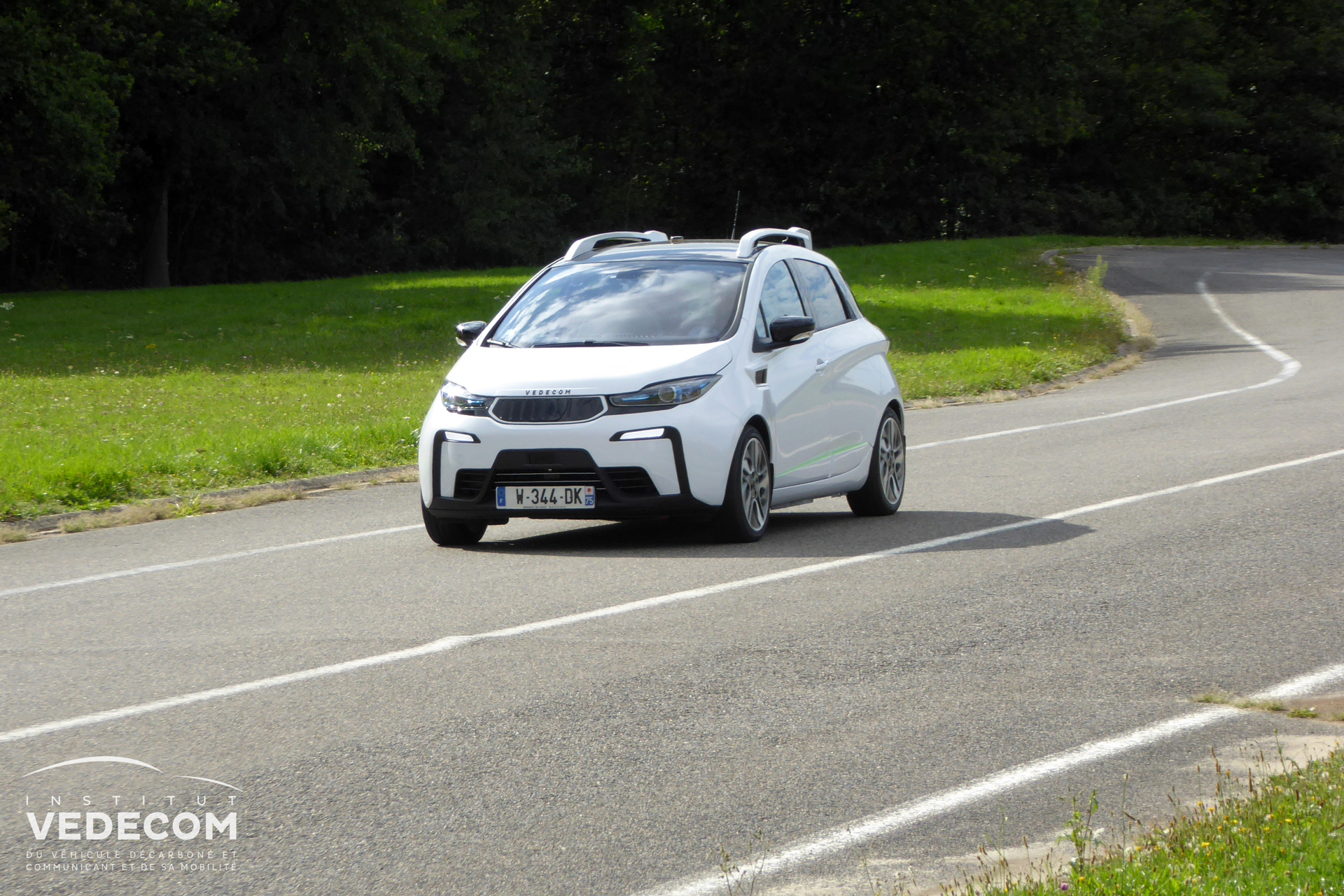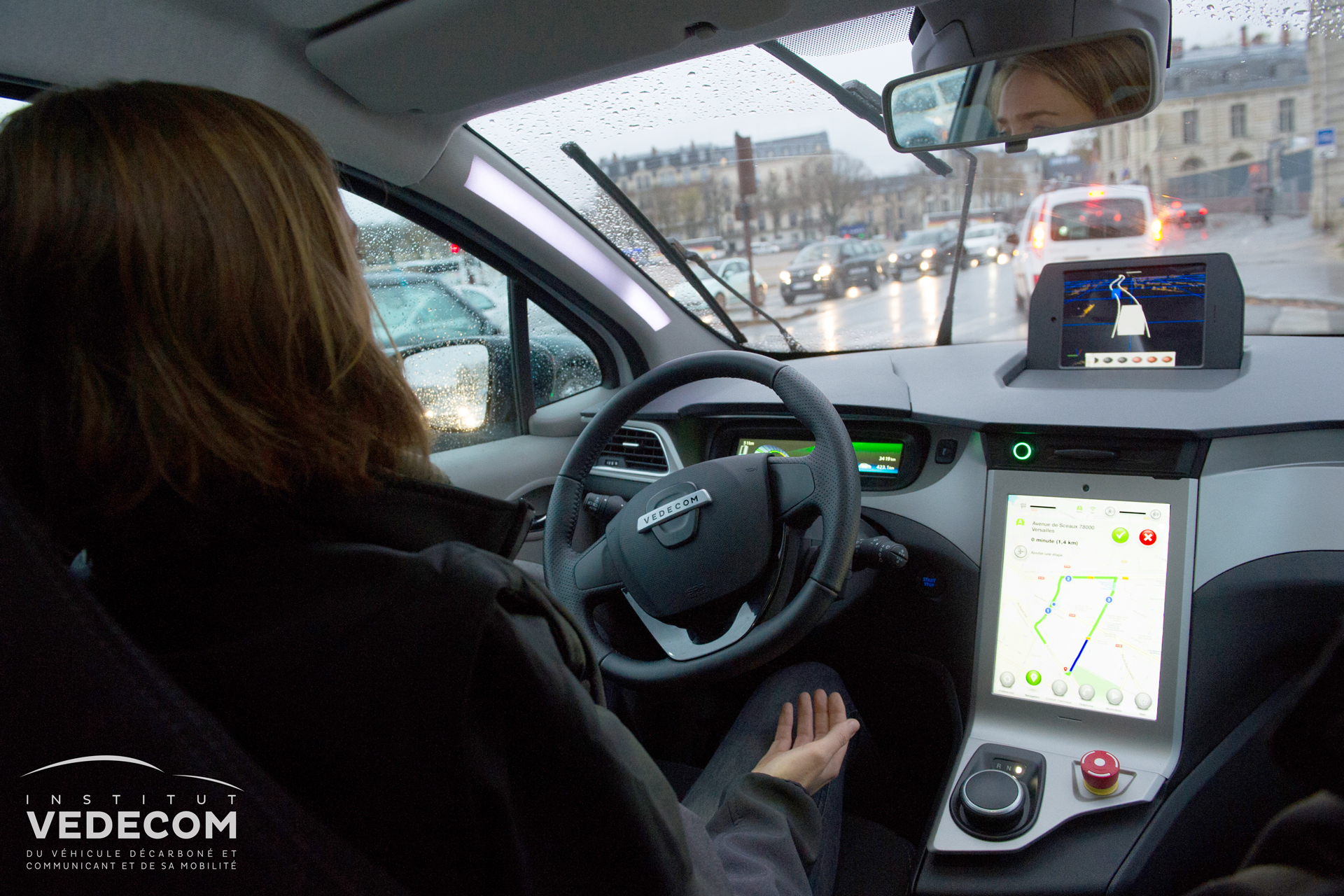Research Fields
Our ITE’s vocation is to be a centre of excellence primarily focused on industrial and/or services development through the pooling and strengthening of public and private research capabilities.
It covers the entire innovation process up to demonstration and industrial prototyping.
VEDECOM’s R&D and innovation activities are based on three main areas: electrification, automated and connected vehicles, new mobility solutions and shared energy.
For each of these three areas, a strategic scientific roadmap is defined in consultation with the Institute’s partners within the Research Area Committees. They are steered by experts from the founding members.
In addition to these three R&D fields, there is a transversal field whose objective is to develop multidisciplinary projects with a strong European dynamic.
Electrification
The challenge in the fiel of electrification is to reduce considerably the energy consumption and emissions from current vehicles. To do so, the Institute’s researchers are tasked with identifying and implementing the technological breakthroughs that will eventually lead to the French automotive industry commercialising large numbers of electric and hybrid vehicles, which will be affordable to as many people as possible.It also means increasing the range of electric vehicles and improving the user experience of charging.
In March 2016, an electric machine prototyping workshop was created, forming the first building block of the future centre of excellence. With this, VEDECOM provides its researchers and partners with a unique, confidential environment where they can rapidly produce the physical parts resulting from their research work, subsequently boosting the creative process.
VEDECOM is thus positioning itself both as a driver of innovation and an innovation accelerator to facilitate and accelerate the adoption of emerging technologies. In this spirit, VEDECOM coordinates the Mobena Initiative for new e-mobility according to the ISO 15118, which includes plug and charge and smart charging.
Connected and automated vehicle
The field of self-driving and connectivity addresses a different form of ground-breaking technology: automated modes of transport.
This is a major technological breakthrough: increasing automated vehicles, operated by a driver or self-driven.
The goal is to improve considerably the safety and the traffic conditions considerably by introducing vehicles that encourage new forms of mobility and make them appealing.
The challenge lies in the need for sustainable, entirely safe forms of mobility that convert the time spent in traffic jams into productive time. This will require research into vehicle equipment and software, and into acceptability from a societal and regulatory viewpoint.
> Focus on SAM Project: a large scale French experimentation
New mobility solutions & shared energies
The field of shared mobility and energy looks at how to share roads better, optimise parking spaces, innovate with electric vehicle charging systems, develop digital services to help with mobility (e.g. traffic forecasts, dynamic car-sharing or easier payments), and explores new uses within territories.
The goal is to develop infrastructures and services that will overturn habits, create a modal shift and encourage users to pool private vehicles to rise to the environmental, economic and social challenges for mobility in urban and semi-urban environments.
Our research projects
15 research projects of ‘Investment for the future plan’ (Programme d’Investissements d’Avenir or PIA)
 |
| SELF-DRIVING VEHICLE |
| ROBUSTNESS OF ARCHITECTURES AND SYSTEMS |
| NEW SECURED COMMUNICATIONS AND COOPERATIVE SAFETY |
| ASSESSING THE SOCIETAL IMPACTS AND ACCEPTABILITY OF DELEGATED DRIVING |
 |
| NEW PHYSICAL SPACES FOR ECOMOBILITY IN THE CITY |
| DEVELOPING DIGITAL SPACES |
| LABORATORY OF NEW USES |
| SHARED ENERGY |
Other partnership-based projects
European projects in progress
Financed by European Commission
- ARCADE (2018-2021) – AV – Autonomous vehicle: “Aligning Research & Innovation for Connected and Automated Driving in Europe”
- CoEXist (2017-2020) – ‘AV-Ready’ transport models and road infrastructure for the coexistence of automated and conventional vehicles
- DriveToTheFuture (2019-2022) – AV – Needs, wants and behaviour of “drivers” and automated vehicles users today and into the future
- INCIT-EV (2020-2023) – EV – Large demonstratIoN of user CentrIc urban and long-range charging solutions to boosT an engaging deployment of Electric Vehicles in Europe
- 5G-MED (2020-2023) – AV – 5G hardware innovation and trialling 5G-based connected and automated mobility
- 5G-MOBIX (2018-2021) – AV – 5G for cooperative & connected automated MOBIility on X-border corridors
- HEADSTART (2019-2021) – AV – Harmonised European Solutions for Testing Automated Road Transport
- SHOW (2020-2023) – AV & EV – SHared automation Operating models for Worldwide adoption: demonstratione in a real environment of advanced mobility concepts: shared, connected, cooperative, autonomous and electric.
- SUaaVE (2019-2022) – AV – SUpporting acceptance for automated VEhicle
- 5G-ROUTES (2020-2023) – 5G & AV – 5th Generation connected and automated mobility cross-border EU trials
- InDiD (Min. de l’Ecologie) (2019-2023) – 5G & AV – Future of French digital infrastructure in France: improving security and preparing connected infrastructure (ITS G5, 4G & 5G) for future vehicles
- 5G-META (2020-2023) – AV – Revolutionising data provision and services in autonomous mobility
Archieved European projects
- ADAS & ME (2016-2020) – AV – Fusing major SoA ADAS systems and sub-functions to consistently and seamlessly support a driver using an automated vehicle
- AUTOMATE (2016-2019) – AV – Enhance safety by using the strength of both the automation and human driver in a dynamic situation dependent way. The automation is understood and designed as the driver’s companion or TeamMate.
- AUTOPILOT (2016-2020) – AV – Automated driving progressed by Internet of things (IoT: towards new mobility services including platooning)
- CARTRE (2016-2018) – AV – Coordination of Automated Road Transport Deployment for Europe
- OPTICITIES (2013-2016) – NMS – Optimise Citizen Mobility and Freight Management in Urban Environments
- FABRIC (2015-2018) – EV – Feasibility analysis and development of on-road charging solutions for future electric vehicles
- ESPRIT (2015-2018) – AV, EV & NMS – Easily diStributed Personal RapId Transit – Connecting transports
- COSMOS (2018-2021) – AV & EV – COherent Support for MObility.E Strategy: aims at supporting the ECSEL Lighthouse Initiative Mobility.E related to clean and automated road mobility solutions by establishing a central R&D&I platform
National projects
- SAM – Sécurité et Accessibilité de la Mobilité Autonome (2019-2022) – AV – Safety and accessibility of driving and autonomous mobility in France : project management and coordination of 13 large scale experimentations – Actualités Linked In
- TIGA – Métropole Rouen Normandie (2019-2029) – AV, EV & NMS – Fully rethinking mobility system for Rouen French Metropol to design an large offer including all modes, services and usecases
- PAC V2X (FUI) (2016-2020) – AV – Extended perception for automated driving by V2X cooperation
- AutoConduct (ANR) (2016-2019) – AV – Adaptation of the autonomous vehicle automation strategy (levels 3-4) and IHM to the needs and condition of drivers in real conditions
- SURCA (FSR) (2018-2022) – AV – Safety of road users and automated driving: study of interactions between vehicles and users if introducing automated vehicles level 3, 4 and 5 in order to supply recommandation to design adapted vehicles
- SMART V2I (PSPC – BPI) (2020-2022) – 4G & 5G – Studying and optimizing video transmission between infrastructure and vehicles with new generation of encoding solutions
Archieved National projects
AV: Automated Vehicles // EV: Electric Vehicles // NMS: New Mobility Solutions












